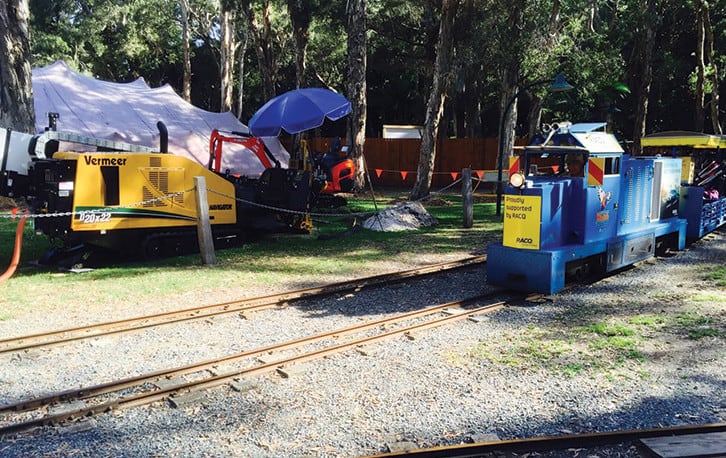As an independent contractor, it takes strong will and determination to make the first move in forging a new career path. However, as technologies evolve and new industries form, it is not uncommon to find those who have taken the leap in a different direction, having either expanded their services or crossed over to different industry sectors.
Paul Barrett, founder and head of Pro-Bore Australia is one of these savvy contractors who made the switch from professional tree lopping into the drilling and boring industry exactly 20 years ago.
“To be honest, before I made the switch into drilling, I knew nothing about the industry. The first time I saw a directional drilling machine, I was standing in a Vermeer workshop, waiting for my wood chipper to be serviced.
“Gary Cowley, one of the founders of Vermeer was working that day and let me take a look at the machine. He told me that if I wanted to make money, drilling was the future.
“I was literally climbing trees one week and drilling holes the next,” said Mr Barrett.
Making the switch
Vermeer helped Mr Barrett get started in the industry, by offering him on-site training as well as introducing him to people from their drilling network.
“I began doing lead-ins to houses for the rollout of pay TV. We did shots across all terrain, including drilling up steep embankments – it was amazing what you could do with these machines.
“Before HDD, companies didn’t have the accuracy for installing pipes under roads, footpaths and creeks,” said Mr Barrett.
Major Projects
Since opening Pro-Bore in 1995, Mr Barrett has continued to work with either one or two Vermeer machines at a time, using a total of six machines over the past 20 years.
The biggest project completed by Pro-Bore was the Tweed Shire (NSW) sewer main, which involved pulling a 350 millimetre diameter pipe for 95 metres underground.
“This job was carried out under a road down at Murwillumbah (NSW) using a Vermeer 16x20A drill. To this day, it is still the biggest shot I’ve done, and certainly a big shot for a small machine. I owe the project’s success to years of on-site experience with drilling in different ground conditions and knowing what to products to use in your drill slurry.”
More recently, Pro-Bore installed 800 metres of pipe at Currumbin Wildlife Park (QLD) which involved drilling beneath animal enclosures, kiosks and the site’s miniature railway. The 63mm pipe was to house communications cables, as the park had upgraded to the fibre optic network.
“When the park ranger had a look at what we were doing and where we had drilled from, it really blew him away. Not only did the park remain open during the project, he couldn’t believe how we could bore under the Emu Pen and come up right beside the foundations of the kiosk 120 metres away.”
The importance of expertise
The biggest problem facing drilling operators is hitting existing utilities, says Mr Barrett, and as competition rises within the drilling space, skill levels and experience are becoming more and more important.
As there is currently no certification required for the operation of HDD equipment, many people are purchasing drills and working on jobs without understanding their limitations, says Mr Barrett. nbn for example, are currently pushing for a certificate of competency to be able to work on their projects.
“Drilling can be life-threatening if you hit underground power, so inexperience is a big problem. Learning to drill well has a lot to do with the feel of the machine and takes a number of years to get good at it.
“Because of this, it is so important for companies to find drilling contractors with a high level of experience who understand safety and can produce good results. Dial Before You Dig have a good online service which makes our life a little easier,” said Mr Barrett.
A bright future
As long as you have the right skills and the ability to adapt, the drilling industry will continue to provide you with diverse opportunities, says Mr Barrett.
“Using quality equipment from the get-go would be my number one recommendation. When faced with challenges on site, you need to be working with equipment you can trust, as well as a team of professionals that can provide technical support no matter the situation.”
“Switching industries is an exciting challenge, and I guess you could say I am a bit of a thrill seeker. However, gone are the days of fighting off swarms of bees high up in tree trunks! Drilling provides me with a much safer and diverse form of work that is continually evolving as time goes by.”














